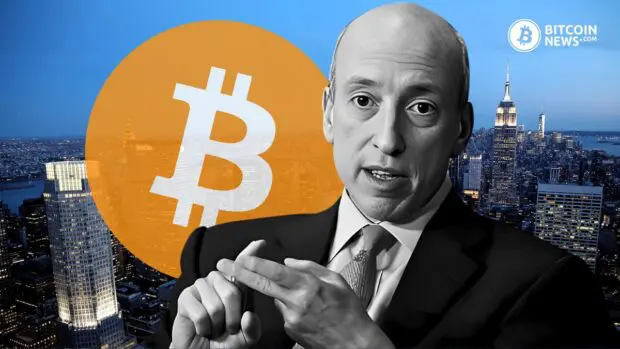In a recent interview with CNBC, SEC Chair Gary Gensler shed light on the approval of spot Bitcoin Exchange-Traded Funds (ETFs), stating his belief about the digital asset, raising irony, criticisms, and contradictions surrounding the decision.
SEC Chairman Gary Gensler acknowledged the approval of 11 spot Bitcoin ETFs as a significant move. However, he also raised concerns about the decision contradicting Satoshi Nakamoto’s original vision for a decentralized financial system.
He stated:
“… No doubt there are innovations within this field and those innovations which I taught about at MIT around a ledger system. It’s just an accounting system called the Blockchain technology. But there’s an irony in the midst of that.
Satoshi Nakamoto said this was going to be a decentralized system. And finance — this has led to centralization. Think about the irony of those who say this week is historic.
This was about centralization and traditional means of finance that investors who could already express themselves in bitcoin, you could already, before this week, buy it through major brokerage houses, but now you can buy it through this thing called an exchange traded product as well, centralized.”
Gensler revealed that he considered the recent court decisions, including those involving Grayscale and Ripple Labs in 2023, as a pivotal factor in the SEC’s shift towards approving the Spot Bitcoin ETFs, adding:
“We move forward. I think this is the most sustainable path forward.”
Bitcoin’s Evolution and Gary Gensler’s Critique
Despite the approval, Gensler expressed his belief that Bitcoin’s integration over the years has led to centralization, deviating from Nakamoto’s decentralized peer-to-peer payment system vision. He argued that the ETF approval brings centralization, allowing investors to buy Bitcoin through major brokerage houses, which he believes is against Bitcoin’s initial ideology.
Interestingly, the SEC chairman pointed out what he perceives as “irony” in labeling the week as “historic” due to the Spot ETF approval. He emphasized the recently approved ETFs will move Bitcoin towards centralization.
Criticism from Senator Elizabeth Warren
Senator Elizabeth Warren, who supported Gensler’s nomination for the position of SEC Chair in 2021, criticized the SEC’s decision on X, stating that the agency was wrong on both legal and policy grounds.
Social media platform X added a note underneath that post, stating that according to readers, The SEC has acted as directed by the court in Grayscale vs SEC case.

CBNC host Andrew Sorkin raised a similar point, asking whether SEC’s decision was completely influenced by court’s ruling. Gensler replied:
“We do everything here at the Securities and Exchange Commission within the law and within how the courts interpret those laws. And that’s what the American people expect and that’s what we do here.”
Gensler’s Mixed Messaging on Bitcoin
Gensler‘s statements stirred controversy as he approved Bitcoin ETFs while simultaneously criticizing Bitcoin and the broader digital asset industry. He described Bitcoin as a speculative and volatile asset, highlighting its alleged use for illicit activities.
He highlighted:
“… but, yes, investors, I think, should be aware that this — the underlying asset is a highly speculative, volatile asset, and amongst its use cases is really for illicit activity, money laundering and sanctions and ransomware and the like.
And I know that you’ve asked other people over the last few days, is it being used as a store of value? It is a speculative value store of value. Is it being used as a payment anywhere? Are we buying cups of coffee with it? Not really. The only payment mechanism it’s being used for in sort of a — in a primary sense is illicit activity.”
During the interview, CNBC’s Joe Kernen challenged Gensler’s claims, citing statistics on the scale of money laundering involving Bitcoin compared to traditional currencies.
Kernen stated:
“I don’t know the exact units, but if you look since 2017, what’s been used to launder money […] 20,000 is the unit for a dollar. Thirty-three is the unit for bitcoin. So, that’s a multiple of I don’t know how much for dollars being used for money laundering versus bitcoin.”
Gensler, however, stood by his critique and instead expressed concern about centralization in the Bitcoin market.
Looking Ahead: Ethereum ETF and Regulatory Scrutiny
Gensler addressed the possibility of a spot Ethereum ETF, signaling a cautious approach. He categorized the recent decision as specific to Bitcoin, drawing parallels to gold spot Exchange-Traded Products, adding:
“I look at what we did this week as it’s cabined to one non security commodity called bitcoin like we’ve had gold spot exchange traded products and silver exchange traded products in the past and approved in the past […] This is cabined just to that one non-security commodity token.”
Conclusion: Implications and Investor Caution
As the digital asset industry evolves, Gensler’s mixed messaging, approval of Bitcoin ETFs, and critiques of the digital asset space have generated confusion and debate. Gensler advised investors to exercise caution, considering the highly speculative and volatile nature of Bitcoin.
The long-term impact of spot Bitcoin ETFs on Bitcoin’s value remains uncertain, as regulatory scrutiny continues to shape the landscape of digital asset investments.










